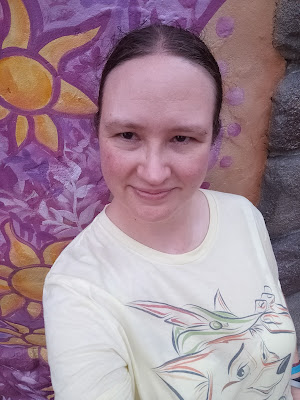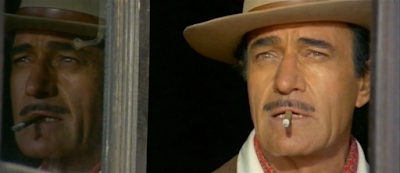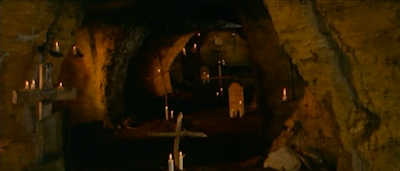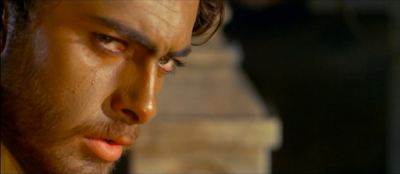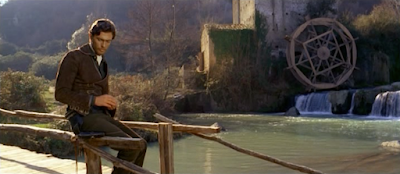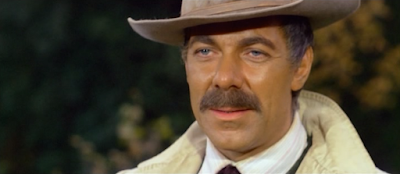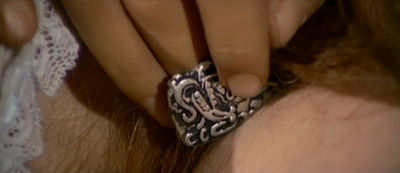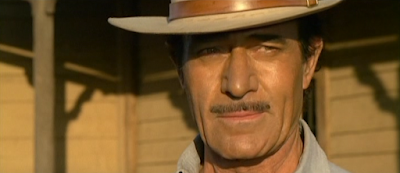I spent quite a few years hankering to see this movie. A Spaghetti Western version of
Hamlet? Yes, please! My husband tracked down a copy for me as a gift a couple years ago, and I was happy to discover it lived up to my years of expectations.
The Wild and the Dirty (1968) is also known as
Johnny Hamlet. And its original title is
Quella Sporca Storia nel West, which I think roughly translates more as "That Dirty Story in the West." That sounds like a much skankier film than this is, so I can see why they translated it just a bit differently.
The copy I have is in a two-pack from "The Spaghetti Western Collection," as pictured here, and it is entirely dubbed into English. Except for Gilbert Roland's lines, I assume, as he appears to be speaking English throughout, and I think that sounds like his voice? Horst Frank might be speaking English too, but I try not to pay much attention to him. You'll understand why later.
I am not marking any spoilers here. I figure a) this is a really obscure movie and you're probably never going to see it, and b) it's based on
Hamlet, so there aren't really any surprises anyway. Except one at the end, but we'll get to that.
The Wild and the Dirty (1968) begins with Johnny Hamilton (Andrea Giordana, billed as Chip Corman) asleep on a beach, dreaming dark things about his father and happy things about frolicking with a girl back home.
Neither dream lets us see anyone or anything very clearly. Smoke obscures the figure he recognizes as his father, and its face remains turned away. The girl never shows her face for more than a moment. Their happy, playful flirting and kissing is mostly hidden behind a tangled mess of flowers. Johnny's past is both obscured and separated from his present.
What awakens him? An actor, sitting on the beach nearby, reciting the "To be or not to be" soliloquy from Hamlet. It's a little bit meta and a little bit of a knowing wink to the audience, and it definitely makes us aware we're about to watch a pretty original spin on this classic Shakespearean tragedy.

Johnny Hamilton is on the way home after the American Civil War. He's clearly enduring some PTSD, and he's also anxious about what may have been happening at home while he was away. This is a serious and pensive Hamlet, but I get the impression he was once a pretty cheerful guy. Before he goes on his way that morning, he saves the actor and his companions from a couple of guys trying to ambush... someone. It's unclear whether they're there to attack the acting troupe or Johnny.
Johnny arrives in his hometown and has a staredown with a couple of creepy, scuzzy locals. He doesn't notice his old friend Horace (Gilbert Roland) because Horace is inside a building when Johnny rides by. But Horace spots Johnny immediately, and watches from a window as Johnny silently passes through town.
You need to know that Gilbert Roland is very, very wonderful in this movie. Notice the director gives us two different views of his ruggedly handsome, but weary face. Very kind of him. I suspect my friend DKoren will particularly appreciate that.
Johnny arrives at the Danark Cemetery, and it's so completely cool that I'm going to spam you with a bunch of screencaps of it, because this cemetery... is inside a cave. And it is fantastic. Feast your eyes:
I'm telling you, this is one of the coolest set-pieces I have ever seen in a movie. Not just in a
Hamlet movie or in a western, but in any movie. It is sooooo evocative and atmospheric and creepy, but also kind of peaceful at the same time.
Here in the underground cemetery, Johnny meets up with the gravedigger (Franco Latini) and finds his father's grave. It has an ominous note carved into the gravestone:

Well, so much for needing a ghost to come bearing the bad news. This gravestone will do the job nicely.
Next thing we know, those two creepy, scuzzy men from town arrive at the graveyard and taunt Johnny about his father's death. Now, up until this point, Andrea Giordana has been playing Johnny like he's in a sort of fog, just drifting about from one event to the next. But one look at the fire in his eyes here, and you know that's all changing:
I love that he still has tears drying on his cheeks. It's so subtle, but so perfect.
Anyway, those two creepsters try to goad Johnny into a fight. But someone in the shadows shoots their guns out of their hands, and off they run. Who is this unseen benefactor? Oh, nobody important, just Johnny's best pal and mentor, Horace. He has this little habit of turning up just in the nick of time and rescuing Johnny from baddies, you see. Handy guy to be friends with.

Horace tells Johnny that his father's murder is blamed on a bandit named Santana. Johnny's uncle Claude then killed Santana. But Horace doesn't sound very convinced about either of those "facts." Johnny heads home to Ranch Elsenor to find his mother and try to learn more. Buuuuuut, more shocks await him there. He walks in and sees his mother Gertry (Francoise Prevost) in the arms of his uncle, Claude Hamilton (Horst Frank), rolling around on a bed like they were teenagers.
Side note: doesn't Andrea Giordana have interesting eyes? Green in the middle and blue around the edges. I'm not sure I've ever seen eyes quite like them before. Beautiful.
Annnnnnnyway, of course, Gertry and Claude are all, "Hey, guess what? We got married! Isn't that fun? It's totally not weird. Why are you being weird about it?" Because, well, Johnny's understandably quite discomfited by this whole situation. He reacts by pouting, taking long walks, thinking a lot, and generally being upset by all that's happened.
But, let's face it: if your uncle married your mom after dispatching the guy who killed your dad, and your uncle looked like a '70s Ken Doll, you'd be weirded out too.
Yeah, Claude doesn't even try NOT to be creepy most of the time. Ew.
Well, at least one person besides Horace is happy to see Johnny back from the war, and that's the sweet and lovely Ophelia (Gabriella Boccardo, billed as Gabriella Grimaldi). She gets called Emily for some reason in cast lists, but the English dub-over has Johnny call her Ophelia, so I'm calling her Ophelia here.
They meet up in that millhouse behind Johnny in the picture of him being all broody. That's the same millhouse he dreamed about in connection with Ophelia, and we get the sense that this was their usual rendezvous spot before he went to the war. Smooching and conversation ensues. Also, the mill is the second-coolest set in the movie, after the cemetery. How come more westerns don't have scenes inside mills? They totally had all sorts of mills in the Old West: gristmills, sawmills, etc. And they make such cool sets.

Well, anyway, Ophelia is possibly a little bit... not all there. She tells Johnny she's sad because her father keeps yelling at her to marry, but she'd promised Johnny to wait for him, and then he took a long time getting home from the war, so her father's been harsh to her. She says Johnny's father is much nicer, knows all about her waiting for Johnny and approves, and even nicknamed her "blue eyes." Which is not very original, since she does have blue eyes, but hey,
it happens. I
think she's talking about Johnny's real father, who is now dead, but she
might be talking about Uncle Claude. In which case, ew! Ophelia! What even?

Um, so, Johnny jumps to conclusions and thinks she's talking about Uncle Claude, and he yells at Ophelia a lot, suspecting she gave herself to Claude and now is running back to Johnny because his uncle's finished with her. But before he can yell too much, back come the two creepy scuzzmeisters. They proceed to beat Johnny up pretty badly, and then rough Ophelia up while he's helpless to stop them. Don't worry, though -- Ophelia comes off pretty well. One of them rips her shirt and forces a kiss on her, and then he lets her run away. After all, she's the sheriff's daughter, so they don't dare actually hurt her much. They'd rather get their jollies beating Johnny up again anyway.
Happily, you remember how I mentioned Horace had this really helpful habit? Well, guess who turns up in the nick of time again.
Don't you want Horace for a guardian angel? Cuz I sure do.
Oh, this is Ophelia's charming father, the Sheriff (Giorgio Sammartino, as Giorgio Sanmartin). I guess the writers decided he didn't deserve a first or last name. I agree with them. Actually, Horace says he has a better name for him than Sheriff, but doesn't tell us what it is. Use your imagination, I guess.
Sheriff is just here to tell Johnny to stay away from Ophelia, and then he rides off after trading insults with Horace.
Well, Horace has a clue he picked up near Johnny's father's body, a very distinctive silver thingamabog.
He's hoping it will help him and Johnny track down the real killer, because they are both starting to suspect it wasn't Santana at all, and that Claude's shooting of Santana was a cover-up for the murder.
So, Johnny starts asking questions. He chats up Uncle Claude about why he ever suspected Santana. He waxes philosophic about the nature of cowardice and courage while sharing an evening drink with Horace. And then, that acting troupe from the beginning arrives!
With them is the lovely actress Betty (Stefania Careddu), who has been interested in Johnny since he saved their lives back on the beach. Or maybe even before that. And, since Ophelia has been forbidden to spend time with Johnny now, and since he's mad at her anyway, Johnny returns Betty's interest, and how.
Now, before you think we've gone completely off track and left the plot behind just because the director's wife thought there weren't enough smoochy-smoochy scenes or something, look what Johnny discovers! Her earrings match that thingamabob Horace found by his father's body!
Betty says she got them from a man down on the border a couple of weeks ago. Does this mean Johnny's father's killer is still alive? (Cue lots of dramatic music.)
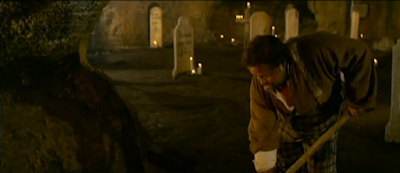
Johnny hires the gravedigger to dig up Santana's grave and see if anyone's in it. Because we did NOT build that amazing underground cemetery set to only use it for one scene. Unfortunately, there actually is a dead body in the coffin, and it even has a gunbelt with those little thingamabobs on it.
Uncle Claude is not super happy about Johnny digging around in the past, so to speak. He scolds Johnny for "sniffing around like a miserable, stinking dog," and Johnny gets good and angry over this, treating us to this perfectly scrumptious glare:
Uh, yeah, where was I? My goodness, that glare is distracting. Oh! Yes. Meanwhile, back in town, Betty the actress turns up dead, and robbed of her earrings, too. Next, Johnny gets ambushed in the saloon, and we all know what that means.
That's three times Horace has come to Johnny's rescue, if you're counting.
Johnny decides to go on a little trip to try to find out where Betty the actress got those earrings. His mom brings him his dad's fancy dueling pistol because we haven't seen her much yet, and she looks really nice in that red dress.
Cue Johnny riding around among some really interesting rock formations.
He has a big fight with some of Santana's henchmen, discovers that Santana isn't dead after all, and ::GASP!:: that Santana is actually pals with Uncle Claude. Something about bonding over a gold shipment they robbed together, though it turns out that it's possible Uncle Claude stole the gold from Santana and kept it for himself.
Santana gets pretty miffed about probably getting double crossed, as one does. So, they all head off to force Uncle Claude to show them where he hid the gold. But before they do, Johnny gets probably my favorite line in the whole thing. He tells Uncle Claude "I refuse to waste time with any more of your play acting. Once you understand that, I'll be all right." I LOVE that line.
One ambush later, and Johnny's in serious trouble. I think you know by now what that means.
Time for Horace to randomly come riding by and rescue him! Alas, Horace gets shot in the leg in the process. Johnny helps bandage him up once they're safely away, and the two friends say goodbye before Johnny rides off to find his destiny. Neither of them expects to see the other alive again.
Meanwhile, back at the ranch, Uncle Claude shoots Ophelia and dumps her body in the river along with Johnny's dad's gun, which Johnny dropped during that ambush. Now, Johnny's wanted for Ophelia's murder.
Annnnnnnnnnd it starts to look like Johnny's destiny is pretty danged unpleasant.
He gets caught, beaten, and trussed up between two poles to die in the sun because just killing him would have ended the movie too soon. We can't end the movie until we have an overly long gunfight between Uncle Claude's pals and Santana over the whole double-cross thing with the gold shipment.
This also gives Gertry a chance to figure out her new husband is a skunk, get shot by one of his henchmen, ride around in the desert after having been shot, and try to rescue her son from the Sheriff's "justice." Which she has no choice but to do, since Horace is off nursing a wounded leg and is unavailable for rescues at the moment.
Or is he?
Commence rescue number five! That guy Horace is unstoppable.
Johnny's hands are all messed up, so when he and Horace go after the two creepy skeezeoids from town and Uncle Claude, he has to tie his gun to his hand. Which I think is a pretty neat visual version of Hamlet's line "O, from this time forth, My thoughts be bloody, or be nothing worth!" (Hamlet, IV, 4)
A couple more shoot-outs occur, which take care of all the bad guys. When the smoke and gold dust clear, the gravedigger arrives with a wagonload of coffins, ready to get to work.
He's greeted by the last two men standing.
I promised you a surprise at the end! Johnny Hamilton doesn't die! He rides away with Horace, leaving all the death and destruction behind. And the gravedigger, even though he says he's the fastest shovel in Texas, maybe the whole west.

Is this movie family friendly? Basically, yes. There's some kissing between Claude and Gertry and between Johnny and Betty, both involving lying on a bed, but kissing is all that happens. Emily's dress is torn from her shoulder, exposing her corset, which covers as much as a one-piece bathing suit would. It's clear that her attacker is messing with her just to get to Johnny, and she runs away without being molested more than that. There's a little bad language, and definitely a lot of violence, most of it gunplay, but some of it fist fighting. And Johnny looks dead at one point, when he's hung on the X-style cross, which could be scary to younger viewers. I would say this is fine for teens and some tweens, but a bit much for children. Or, too much for my ten-year-old, anyway.
Here's how I'd "grade" this adaptation of Hamlet:
Hamlet/Johnny Hamilton: A
Horatio/Horace: A+
Laertes: N/A
Ophelia/Emily: C
Claudius/Claude: B-
Gertrude/Gertry: C
Polonius/Sheriff: N/A
Overall Production: N/A because it's a retelling, not a production of the play.
If you want to see how it stacks up against the other 19 adaptations/productions of
Hamlet I've seen, check out my
"Hamlet" Adaptations page.
I took a lot of really nice screencaps of Gilbert Roland that never fit in the review, so I'm just going to share the best two here, because I can't bear to deprive you of his handsome closeups.

.jpg)






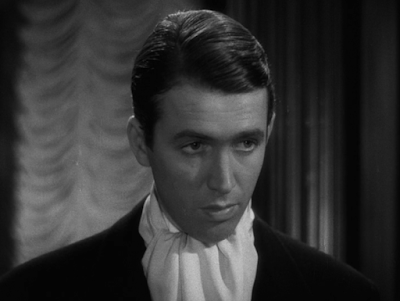


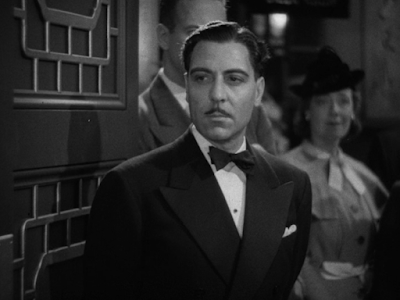


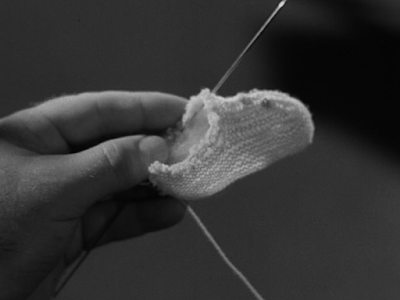









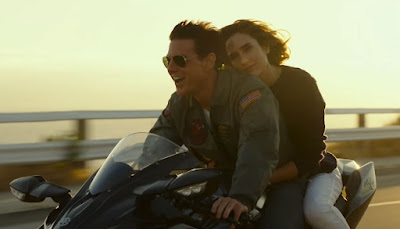





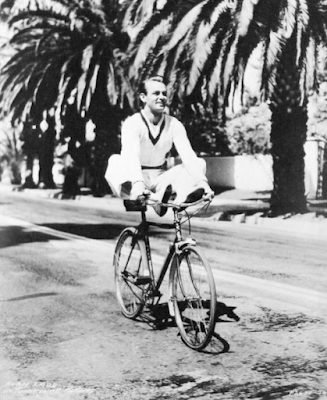

.jpg)





